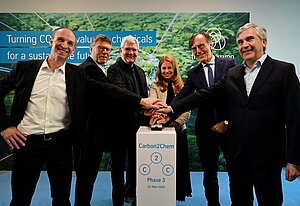The successful Carbon2Chem® research project is entering its third phase: with new funding of 50 million euros from the Federal Ministry of Education and Research (BMBF), the verification of previous research results will be further advanced. The Max Planck Institute for Chemical Energy Conversion (MPI CEC) plays a central role in this project and makes decisive scientific contributions to making industrial processes more sustainable.
Since 2016, Carbon2Chem® has been researching how steel mill gases from steel production can be used as valuable chemical raw materials to produce fuels, plastics or fertilisers, for example. In the second phase of the project, it was successfully demonstrated that methanol production from various carbon sources is technically feasible. The focus is now on the further development of these technologies, particularly with regard to gases from direct reduction and the quality of methanol and hydrogen. The MPI CEC is contributing its expertise in chemical energy conversion in order to further optimise innovative catalysis methods and electrochemical processes.
With new partners and expanded research objectives, Carbon2Chem® will continue to play a key role in industrial decarbonisation. Prof. Dr Walter Leitner, Director at the MPI CEC, emphasises the importance of cooperation between science and industry: ‘Carbon2Chem® is a lighthouse and an excellent example of a successful alliance of basic research, applied research and industrial applications.’ Through close cooperation with industrial companies and scientific partners, the MPI CEC is making a significant contribution to driving forward the transformation towards a climate-neutral industry.
Further information can be found in the thyssenkrupp press release.

